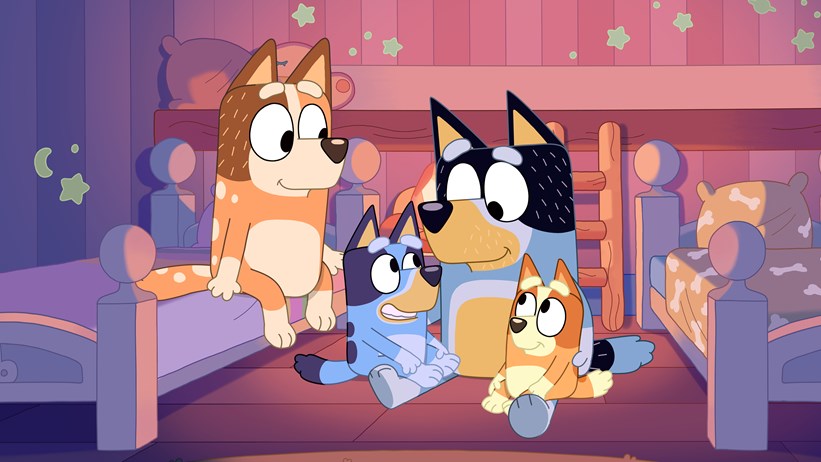'Bluey' and teaching your children about the legal system

The Australian TV show Bluey has been a hit with the preschool set and the adults who love them. Image from BBC Studios.
My son is quickly approaching his fifth birthday. I’ve been writing this column for longer than he’s been alive, so many of my regular readers have seen me reference him in one way or another in multiple installments over the last half-decade. And as he’s grown, so has his taste in entertainment.
Some of you may remember my column questioning whether being forced to listen to “Baby Shark” could be considered cruel and unusual punishment. That’s only one of the ideas I’ve garnered from his viewing/listening enjoyment over the years. As he ages and his interests change, it’s exciting and interesting to see what type of intellectual fuel those little fires can provide.
Examining ‘Bluey’
For the last six months or so, he’s been on quite the Bluey kick. The animated series follows a family of anthropomorphic blue and red heeler dogs, named for heroine Bluey Heeler, a “6-year-old blue heeler pup who loves to play.” It was originally co-commissioned by the Australian Broadcasting Corp. and the British Broadcasting Corp. as a show for preschool-age children. It’s lighthearted and fun, and the family-centric dynamic offers quite a bit of social learning.
First and foremost, I’m a fan of the show. I’ve definitely grown a soft spot for Bluey’s father, Bandit Heeler. He’s funny, creative and constantly going out of his way to find opportunities to engage with his kids while indirectly instilling valuable life lessons. Moreover, the episodes only run from seven to eight minutes, so it’s easy to let my son watch “just one more.”
Secondly, it’s good-natured. As we monitor my son’s viewing habits, I’ve noticed that it’s challenging to find series that he enjoys that are also sneakily educational. With Bluey, that pragmatic aspect doesn’t come off as overbearing or intrusive. It’s fun to see the takeaways that he pulls from one episode to the next.
Explain this to me like I’m a 2-year-old
But finding a series that seamlessly boils down challenging ideas and systems into kid-friendly, digestible portions can be challenging. Denzel Washington’s iconic plea for a simple explanation to complex situations (courtesy of the film Philadelphia) also holds true for actual children. Some concepts are just too heavy or convoluted to dilute down to the level of preschool comprehension. Nevertheless, some segments of children’s entertainment have a special knack for breaking down complicated ideas into bite-sized morsels.
I saw that play out on a recent Saturday morning. My wife and I have become increasingly aware of our son’s screen exposure. We know that we have to monitor and control the amount of time that he spends watching TV or playing video games, and we do our best to limit that to one or two hours per day. It’s a lot easier now that the weather is warming up, but it’s still a bit of a battle.
Consequently, we have to be diligent and observant. As I was making breakfast, I noticed the familiar Bluey theme song, and I assumed that it would be an episode that I’d likely seen at least once or twice before. Surprisingly, however, it was an installment I had yet to view.
Episode 27 of season three—entitled “Family Meeting”—sees the Heeler family contesting an in-house controversy. Bandit is accused of “fluffing” in Bluey’s face, which he adamantly denies. The mother, Chilli, takes on the role of judge—along with her wooden-spoon gavel and her hair curls reminiscent of a barrister’s wig—and the parties are allowed to state their cases.
Chilli starts by setting three ground rules: Only one person talks at a time, everyone refers to the accused act as a “fluffy” (to which Bandit quickly corrects as an “alleged” fluffy), and everyone tells the truth. So from the outset, we’ve got a firm foundation of decorum, respect and honesty. Sounds good.

Image from BBC Studios.
Bluey’s younger sister, Bingo, asks what “allegedly” means. Chilli aptly and succinctly explains that, “It means you both get to tell your side of the story, and [she] decides who’s telling the truth.” Her explanation is followed by Bandit’s acknowledgment of “Yes, your honor,” which leads Chilli to order the fourth rule: Everyone calls her “your honor.”
Bluey starts the prosecution by explaining the allegation, followed by “Judge” Chilli quickly stating that she’s heard enough. She appears ready to rule. Not to be sidestepped, Bandit pleads to explain his case, and Chilli responds, “Oh, yeah, your side. Make it quick.”
Any defense attorney who’s practiced long enough can sympathize with that exchange.
Undeterred, Bandit proceeds to butter up Chilli and state his version. In perhaps my favorite part of the episode, Bluey presents exhibits of Bandit’s diet over the last 24 hours, in conjunction with her fairly impressive cross-examination (complete with leading questions).
Bandit squirms under the pressure of the leading questions. Bluey gets Bingo to fib her testimony for a lollipop. Chilli reminds them all that, “The truth will set you free.” The story’s ultimate result isn’t important. What is, though, is that the episode provided me an excellent opportunity to talk with my son about court proceedings, how you can tell when someone isn’t being honest, and the importance of telling the truth—unless you want someone like Dad to catch you lying.
Different strokes for different folks
Different parents will likely feel different ways about what, if anything, their child has to know or understand regarding any given legal system. Still, they must at least acknowledge that their children will likely become part of that process in one way or another at some point in their life. Whether as a juror, a party, a witness or a licensed advocate, many of us participate in a court proceeding at some point.
That idea of differing approaches applies to parents who work as attorneys in different areas of practice, as well. Take me, for example. As a criminal defense attorney, I have certain opinions regarding the American criminal justice system. I’ve seen the good, and I’ve seen the bad. I’ve had plenty of clients acquitted at jury trial, and I’ve had some clients sentenced to life imprisonment. That’s not an easy or even appropriate issue to broach with my son at this age, though.
Nevertheless, he’s getting old enough to question what I do for a living. He’s been to my office more times than I could ever count, but he also knows I go to court for work, too. Now, I’ve never taken him to court, so he’s never seen me in that environment, but he does ask what I do while I’m there.
I don’t think he’s quite ready for a dialogue regarding the criminally accused, nor would it be beneficial to try and explain that I help people who other people think are “bad guys.” But I know that conversation is coming sooner rather than later. I’m admittedly biased, but the boy is smart. He knows my job is to ask questions, and for the time being, he thinks my job is to catch liars.
It just so happens those liars come in various forms. In that vein, I struggle with how to talk to him about police officers. I tell him the police are good and here to help and protect us. I know at some point, though, I’m going to feel compelled to teach him that he has constitutional rights that protect him too, and sometimes he has to use those rights to protect himself from the government. Still, how do you explain to your child that the police are there to help you, but you should never talk to them without your daddy (or some other attorney) around?

Adam Banner
Adam R. Banner is the founder and lead attorney of the Oklahoma Legal Group, a criminal defense law firm in Oklahoma City. His practice focuses solely on state and federal criminal defense. He represents the accused against allegations of sex crimes, violent crimes, drug crimes and white-collar crimes.
The study of law isn’t for everyone, yet its practice and procedure seems to permeate pop culture at an increasing rate. This column is about the intersection of law and pop culture in an attempt to separate the real from the ridiculous.
This column reflects the opinions of the author and not necessarily the views of the ABA Journal—or the American Bar Association.



